"Storm is death." How Suvorov destroyed the Turkish garrison of Izmail
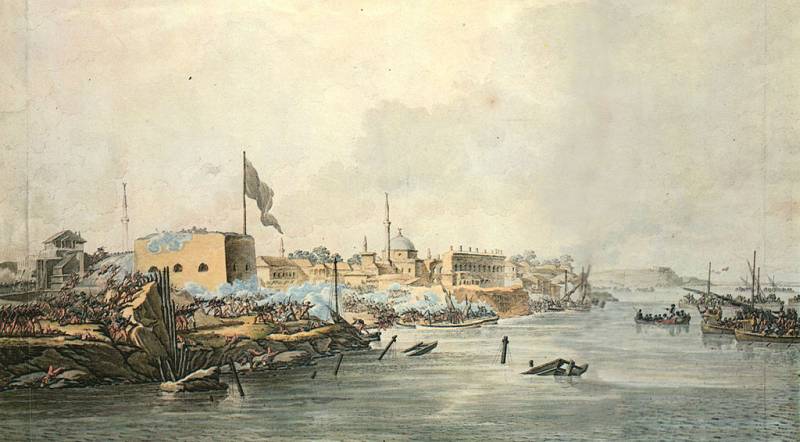
Engraving by S. Shiflyar "The storming of Ishmael on December 11 (22), 1790". View from the river side. Based on a watercolor drawing by the battle artist M.M. Ivanov
Impregnable fortress
During the 1790 campaign, Russian troops laid siege to Izmail, the largest and most powerful Turkish fortress on the Danube. It was an important communications hub in the Danube. Before the start of the Russian-Turkish War, the Ottomans, with the help of European engineers, improved the fortifications of the Izmail fortress. It had a high rampart (6-8 meters), a wide deep ditch (width up to 12 meters, depth - 6-10 meters), 11 guns stood on 265 bastions. The stronghold was defended by a whole army - 35 thousand people (some of the troops were of an irregular militia character). The remnants of the garrisons from other fallen Turkish fortresses fled to Ishmael. The garrison was commanded by Aidoslu Mehmed Pasha and the brother of the Crimean Khan Kaplan-Girey with his sons. The Turkish sultan ordered to keep Ishmael at any cost and subject to death all who lay down weapon.
Russian troops (over 30 thousand soldiers and 500 guns, not counting ship guns) under Izmail were commanded by Generals Gudovich, Samoilov, Pavel Potemkin (a relative of His Serene Highness). Russian flotilla on the Danube was led by de Ribas. Field Marshal Potemkin did not appoint the chief chief. The generals conferred, doubted, argued, but did not dare to undertake a general assault. And there were no clear instructions from the commander-in-chief. The Russians were able to almost completely destroy the remnants of the Turkish flotilla on the Danube under the walls of Ishmael (up to 100 ships), but there was no success in capturing the fortress itself. Autumn came, winter was approaching. The troops, as before at Ochakovo, suffered from deficiencies in the supply system. Food was running out, no fuel was prepared. Diseases flourished in the siege corps. The soldiers quickly fell ill in the damp and cold dugouts. The Turkish garrison had large reserves, lived in a warm place and did not experience any particular problems. When the commandant of Ishmael was offered to surrender the fortress, he replied: "I don't see what I should be afraid of." At the end of November, the military council of the Russian siege corps decided to lift the siege of Izmail.
Potemkin did not like this. The political situation was serious. Austria withdrew from the war. England and Prussia took an openly hostile position towards Russia. France helped the Porte. Poland threatened with an uprising. A major victory was needed. His Serene Highness ordered Suvorov to lead the siege corps. Alexander Suvorov at this time with his detachment stood in Byrlad, 100 miles from Ishmael, and languished with idleness. He immediately launched a vigorous activity. He sent the Fanagoria grenadier regiment formed by him to the fortress. Organized the supply of troops. All available entrenching tools were sent to Ishmael. As well as the manufactured assault ladders. At this time, the news came that the troops near Ishmael began to lift the siege. General P. Potemkin was the first to leave. The river flotilla was going to Galati. The commander-in-chief gave Suvorov to decide for himself: whether to continue the siege or to lift it. Alexander Vasilyevich did not hesitate. He ordered Potemkin's troops to return to Ishmael and galloped with a convoy of the Cossacks there.
"Rather the Danube will flow backwards, and the sky will fall to earth, than Ishmael will surrender"
In the early morning of December 2, 1790, Alexander Suvorov arrived at the Russian camp near Izmail. I immediately held a meeting and studied the situation. Up to 20 thousand soldiers remained under the walls of the fortress, half were Cossacks, many of whom did not even have firearms. There are many sick people, exhausted by fever. Food is running out, ammunition is scarce. Siege work was carried out sluggishly or was completely abandoned. The heavy guns have already been removed and taken away. And the Turkish garrison is provided for everything and is fully combat-ready, relies on a system of powerful fortifications.
Alexander Vasilyevich immediately began to prepare for the assault. Teams of soldiers were sent to harvest dry reeds for fuel. The Russian camp immediately acquired a residential look. The number of smoke in the Russian camp multiplied. The Turks decided that a large reinforcement had arrived with Topal Pasha ("lame general"). The new commander sent marketeers (food merchants) under Ishmael, improved supplies. Outposts were removed on the roads, and carts of local residents were drawn to the Russian army. Regimental cash drawers were unsealed for the purchase of provisions. A copy of the Izmail rampart with a deep ditch was built far from the enemy's eyes, and wolf pits were prepared in front of it. Young soldiers were taught how to cover pits and moats with wattle and fence, and use assault ladders. On the banks of the Danube, a battery of 40 cannons in each was placed on both flanks in order to give the enemy the appearance of preparing a long siege.
On December 5, the regiments of General Potemkin returned to Izmail, the size of the army increased to 30 thousand. On December 6, the Phanagoria grenadiers arrived. On December 7, Suvorov sent a letter to the commandant of the fortress G. Potemkin with a proposal to surrender in order to avoid a lot of blood. The surrender was honorable: the Turkish troops were released, like all civilians who wanted to, with all their property. Otherwise, Izmail was promised the fate of Ochakov. Suvorov himself added: “Twenty-four hours to think - will; the first shot is already bondage; assault is death. " Aidos-Mohammed refused to surrender the fortress. At the same time, he wanted to play for time and offered to give him 10 days to think. However, Suvorov easily guessed the Turkish trick.
On December 9, a council of war was assembled. Alexander Suvorov briefly outlined the situation. I asked the commanders: "Siege or assault?" According to the rules of the military regulations, the junior commander was the first to speak. It was a Don Cossack, Brigadier Platov. "Storm!" - he said. Everyone repeated that word. The commander appointed the assault on December 11 (22). The troops were divided into three parts, each with three columns. General de Ribas's troops (9 men) attacked from across the river; on the right wing there were Potemkin's regiments (7,5 thousand), they struck from the western part of the fortress; on the left wing of the army of Samoilov (12 thousand) - from the east. In the reserve was the cavalry of Westphalen (2,5 thousand people), which was supposed to repel the enemy's sortie from any four gates of the Izmail fortress.
Of the nine assault columns, three had to take three vertices of the enemy triangle (the fortress had the shape of a triangle in its plan), the strongest points of Ishmael. These three columns were made up of the finest battalions of the Suvorov regiments, renowned for his victories. Suvorov entrusted the command to three experienced generals. On the left flank, the 1st column of Lvov was to take the old Tabia redoubt by the river. The 3rd column of General Meknob stormed the north-western peak of the triangle, here the height of the ramparts and walls reached 24 meters. The eastern summit was stormed by the 6th column of Kutuzov. The fortress here adjoined the river, protruding forward by three bastions. The assault was scheduled early in the morning in order to reach the rampart in the dark and take it, avoiding the fire of numerous enemy artillery. The assault detachments had the best riflemen and workers in front with axes, picks, shovels and crowbars. There was a reserve squad behind. The soldiers carried bundles of brushwood with them and dragged fences to overcome wolf pits and ditches.
Assault
Artillery preparation was carried out on December 10, 1790. The fire was conducted by about 600 guns from the coastal batteries of Chatal Island on the Danube and ships of the flotilla. The Turks answered with all their guns. Hundreds of guns fired. They did not spare the shells, since they had not planned a siege. The artillery preparation lasted almost a day and ended 2,5 hours before the assault. Russian shells caused serious damage to the fortress, and the city was also damaged. On the Russian side, the flotilla suffered damage. One brigantine was blown up by a successful enemy shot. More than a hundred crew members died immediately in the waters of the Danube. On this day, the Russians lost over 370 people killed and wounded.
The assault did not come as a surprise to the enemy, it was expected. Several defectors informed the Turkish command of the preparation of the Russian attack. At three o'clock in the morning, a signal rocket shot up, the Russian troops rose, took the assigned positions on the second missile, and rushed to the enemy stronghold on the third. The Turks responded with rifle and artillery fire. Russian shooters beat the enemy, aiming at the flashes of rifle shots. Under their cover, the columns overcame the ditch and began to climb the ramparts. Ladders were placed against the stone walls. The front soldiers died, they were replaced by others. Even in the dark, Russian soldiers broke into the rampart, crowding the enemy. The 2nd column of Lassi at 6 o'clock was the first to cross the shaft. Redoubt Tabia was not taken with a frontal attack. Then the Absheron riflemen and Phanagoria grenadiers cut through the palisade between the redoubt and the coast and attacked in the rear captured the coastal batteries. The Turks from the redoubt launched a counterattack. The Janissaries fought fiercely. Lvov was wounded. The Phanagorians responded with a bayonet blow, throwing back the enemy, then bypassed the redoubt, captured the gates, opened them and let in the reserve. Then they connected with the fighters of Lassi. The Khotyn gates were open to cavalry. But the Ottomans still held the main tower of the Tabia redoubt.
Meknob's column stormed the northern corner bastion of the fortress. She had the worst. Here the depth of the ditch and the height of the rampart were so great that the assault ladders of 5,5 fathoms (over 11,5 m) were short, they had to be tied in length by two. The advanced daredevils perished. New fighters took their place. Their attack was supported by shooters who beat them on the heads. The fierce resistance of the Ottomans forced Meknob to throw his reserve into battle. The general personally led the soldiers into battle, climbed the assault ladder to the bastion and was seriously wounded (he died from him in 1791). Having broken the stubborn resistance of the enemy, the Russian soldiers took the bastion and captured the neighboring fortifications.
The poorly armed Cossacks of the 4th and 5th columns of Orlov and Platov suffered heavy losses. The lances were of little help in fierce melee combat. Orlov's fighters were able to break through to the shaft. However, the Bendery Gates opened here, and the Turks, shouting "Alla", made a sortie. The Janissaries cut the assault column with a flank blow. The Cossacks mingled, they were thrown into the ditch. Only cavalry and infantry reserves were able to rectify the situation. The hussars with sabers and infantrymen with bayonets drove the enemy into the fortress. The Cossacks went on a new assault and again fell onto the rampart. Platov's neighboring column crossed the chest-deep ditch in icy water, then climbed a steep rampart, clad in stone. The Cossacks had to drive the debris of the peak into the crevices between the stones and stubbornly climb under enemy rifle fire. When Orlov's column was under attack, Platov's Cossacks retreated. They were reinforced with an infantry battalion. The 5th column resumed the attack and captured the rampart, got in touch with the neighbors.
The 6th column of Kutuzov broke through the enemy positions simultaneously with the troops of Lassi and Lvov. The forward battalion lost almost three-quarters of its men in a fierce battle. The situation was critical. Kutuzov with a battalion of the Suzdal regiment rushed into the attack. Kutuzov's fighters took the bastion at the Kiliyskie gates and the rampart to the neighboring bastions. De Ribas's troops were successful. Under cover of battery fire from the island of Chatal and ships of the flotilla, all three columns on ships crossed the Danube and landed on the shore. The paratroopers, despite the resistance of 10 thousand Turks and Tatars, captured the coastal fortifications and batteries. This was facilitated by the success of the Lvov column, which captured part of the enemy's flank batteries.
Ishmael is ours!
After a short rest and assessment of the situation, the Suvorovites continued their attack. The second part of the assault was no less difficult than the first. Having taken possession of the entire outer belt of the fortress fortifications, the Russian troops were greatly stretched out and suffered significant losses. Almost all of the officers were wounded, often seriously. The Turks had a numerical advantage. They occupied a central position, they could concentrate forces against part of the Russian army. Large stone houses, barracks, tall "khans" (hotels) - it was necessary to storm them. It was difficult to operate on narrow and crooked streets. Thousands of horses burst out of the burning stables, racing through the streets in frenzy and increasing the disorder.
Russian columns from different sides began an offensive towards the city center: from the right wing of Potemkin's troops, from the north - the Cossacks, from the left wing - Kutuzov, from the coast - de Ribas. All the remaining reserves were brought into Ishmael. The cavalry blocked the passages along the line of the fortifications, destroying those groups of the enemy who were trying to escape from Ishmael. Dozens of bloody hand-to-hand fights ensued. Large houses had to be stormed like small fortresses. To facilitate the assault, Suvorov introduced light weapons into the city, which cleared the way for the infantry with buckshot. At about noon the gamekeepers Lassi reached the city center. The general himself was wounded, but until the end of the battle he was with his soldiers. Here he defeated a detachment of Maksud-Giray. The Tatar prince fought bravely, but most of his soldiers fell, and he laid down his arms.
Seraskir Aydos-Magomekd with 2 thousand janissaries settled in a large palace. The Ottomans repulsed the first Russian attack with grapeshot. Our soldiers pulled up their guns, knocked down the gates. A Phanagorian battalion rushed in and broke the enemy's resistance. Seraskir gave up. The last strong counterattack was made by Kaplan-Girey. He gathered around him several thousand of the most desperate fighters and tried to break out of the city. However, in a bloody battle, the Turks and Tatars were defeated. Almost all of them died, including the five sons of Kaplan-Girey. At 2 o'clock in the afternoon all Russian columns marched to the center of the fortress, by 4 o'clock all centers of resistance were suppressed. Ishmael is ours!
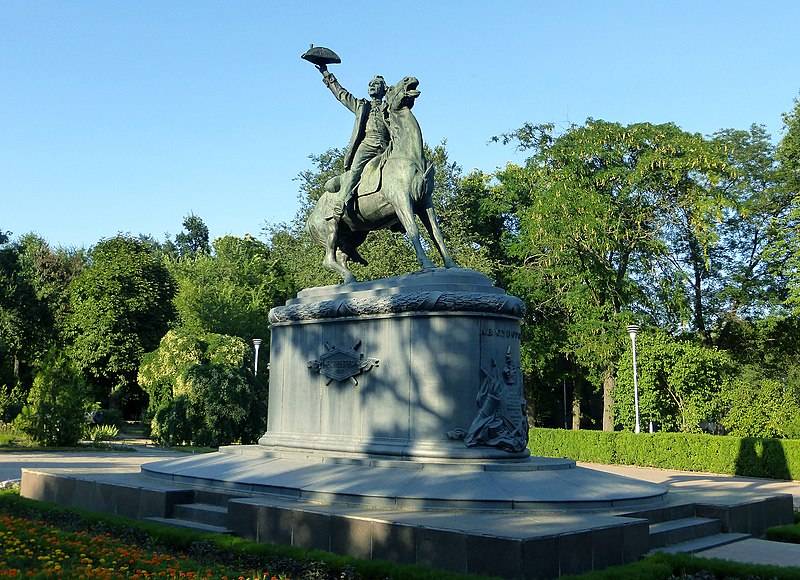
Monument to Alexander Suvorov. Ishmael
Complete victory
Suvorov appointed Kutuzov the commandant of the city. He had to immediately repel the "second assault" of Ishmael. Many local peasants gathered around the city who tried to take advantage of the Russian victory (settle scores with the Turks, rob). The Russians had to take measures to protect the civilian population of the city.
The Turkish garrison was destroyed (only one soldier was able to escape). The losses of the Ottomans were enormous - 26 thousand were killed, 9 thousand were taken prisoner (soon a part died of wounds). There were so many killed that there was no way to bury them. I had to dump the bodies into the Danube. Ishmael was cleared of corpses only after 6 days. The Russians captured huge trophies: 265 guns, a large amount of ammunition, up to 400 banners, the remains of the Turkish Danube flotilla - over 40 ships and ferries, rich booty worth 10 million piastres, thousands of horses. Russian losses - over 4,5 thousand people (including 400 officers out of 650). According to other sources - up to 4 thousand dead and about 6 thousand wounded.
The fall of the Izmail Fortress came as a shock to Constantinople and its western allies. The Russian army opened its way to the Balkans. Turkish troops in other fortresses were demoralized and fled. The storming of Izmail ensured peace on Russian terms.
Deciding on the difficult and dangerous assault on Izmail, Alexander Suvorov put his entire military career at stake. Failure could be the sunset of his star. Victory took him even higher. Suvorov was waiting for the rank of field marshal for this victory. But I didn't wait. Received the rank of lieutenant colonel of the Preobrazhensky regiment (became the 11th such lieutenant colonel). Suvorov was sent to the border with Finland to inspect and strengthen the fortresses. Although it would be reasonable to let him complete the defeat of the Turkish army on the Danube front. And Potemkin received a field marshal's uniform embroidered with diamonds worth 200 thousand rubles (huge money at that time) and the Tauride Palace. The soldiers were awarded a silver medal "For excellent bravery in the capture of Ishmael, officers - gold crosses" For the capture of Ishmael. The generals were awarded orders and other awards: P. Potemkin was awarded the Order of St. George 2nd degree, "Danube Hero" - de Ribas, received the Order of St. George 2-degree and a sword with diamonds, Lassi and Kutuzov - the Order of St. George 3rd degree.
- Alexander Samsonov
- https://ru.wikipedia.org/, https://dic.academic.ru/
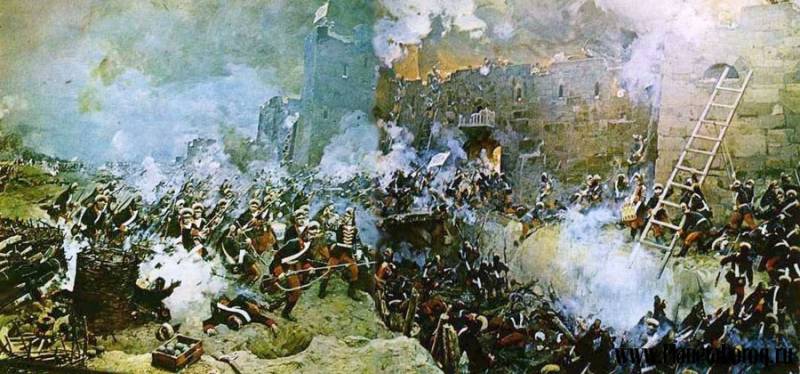
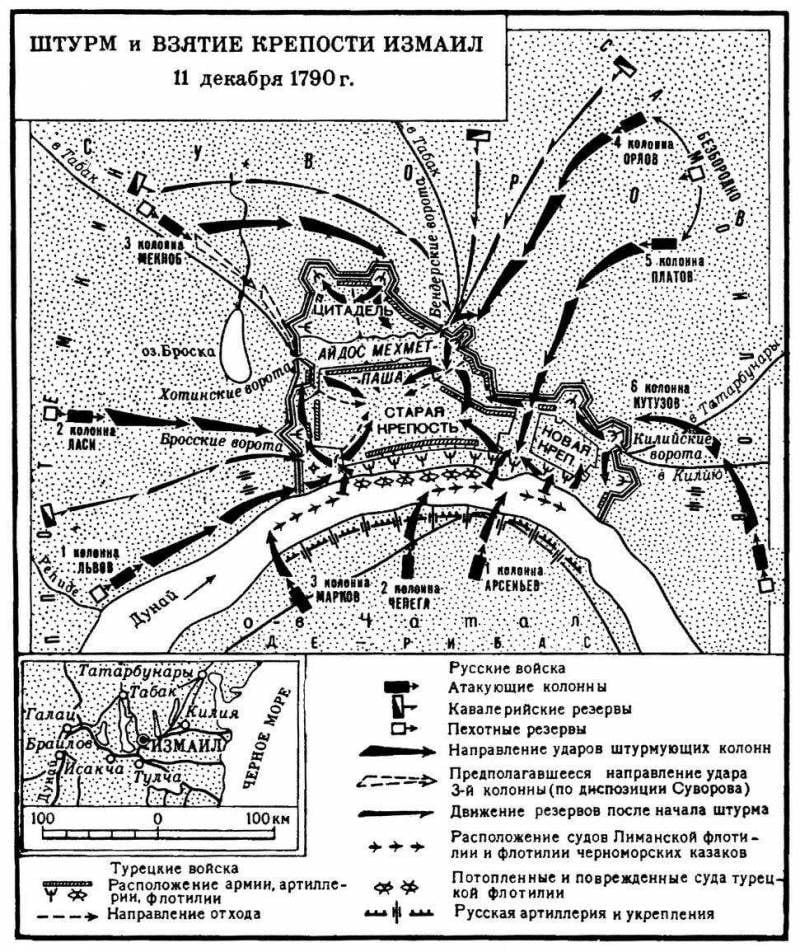
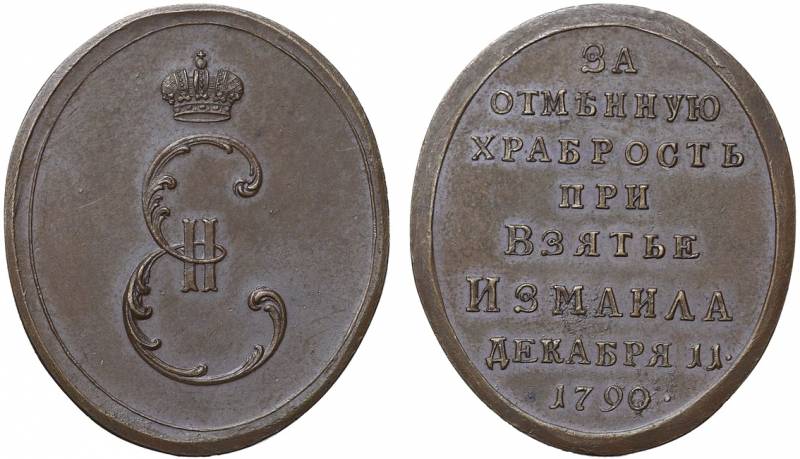
Information